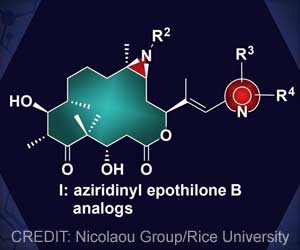Novel compound dubbed MK-8353 offers hope in the treatment of melanoma and other cancers with mutations in BRAF or RAS genes in early phase I clinical trials
- Novel investigational drug dubbed MK-8353 has been developed to block signals such as ERK (Extracellular Signal-Regulated Kinase) pathway, shown to aid cancer cell growth in resistant melanoma
- Advanced melanoma is aggressive skin cancer and resistance to current therapies makes treatment challenging
Reason for Current Study – To Overcome Resistance to Current Treatments
Currently, targeted therapy is approved for advanced melanoma and lung cancer with mutations in the BRAF gene that promote cancer growth and spread, but many of the patients develop resistance and the cancer returns sooner than later.To overcome this resistance, the study team at UNC Lineberger and other institutions developed the MK-8353 compound to try and inhibit signals that help drive resistance, such as a ERK rather than the early signals that initially trigger the hyperactive growth.
Key Observations of the Study
- Three of the 15 patients showed results consistent to partial responses to the new investigational drug.
- The low response rates suggest that combination therapies with the new compound MK-8353 might be more effective
- While trying to establish the safe dose of this drug, the team found that most patients could tolerate treatment up to 400 milligrams twice daily
"This alternative approach may balance higher, though more temporal, suppression of pERK at the tumor tissue in favor of sparing sustained suppression of ERK signaling in normal tissues," the researchers reported.
Future Studies Planned
- UNC Lineberger's Channing Der, PhD, Sarah Graham Kenan Distinguished Professor in the UNC School of Medicine Department of Pharmacology, has begun work on preclinical studies designed to identify possible drug combinations that would improve ERK inhibitor anti-tumor activity and minimize toxicity for patients.
- Based on a promising combination identified, another phase I clinical trial study led by UNC Lineberger's Autumn McRee, MD, associate professor in the UNC School of Medicine, aims to study an alternative investigational ERK inhibitor combination in pancreatic cancer patients.
In conclusion, a lot of recent interest generated in the ERK pathways role in cancer growth and resistance has spurred a series of studies to develop safe and effective ERK inhibitors targeting this pathway. Whether they will live up to expectations, only time will tell.
References:
- Treatment of Metastatic Melonoma: A new World Opens - (https://www.skincancer.org/skin-cancer-information/melanoma/melanoma-treatments/treatment-of-metastatic-melanoma)
- MEK inhibitor - (https://en.wikipedia.org/wiki/MEK_inhibitor)
















